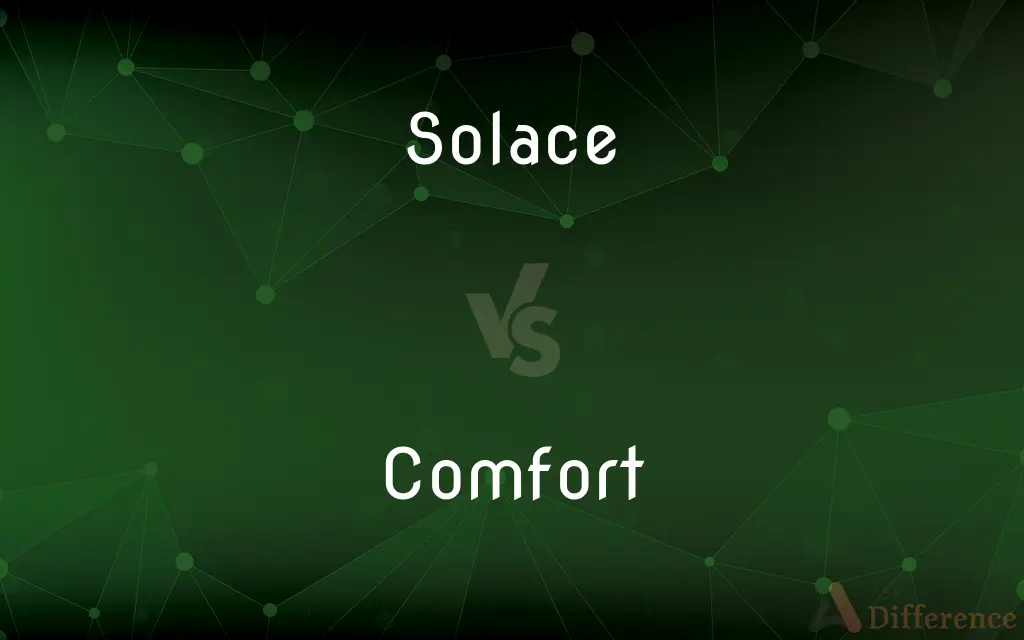Solace vs. Comfort — What's the Difference?
By Maham Liaqat & Fiza Rafique — Updated on April 4, 2024
Solace is finding relief from grief or distress, while comfort is easing physical or emotional discomfort.

Difference Between Solace and Comfort
Table of Contents
ADVERTISEMENT
Key Differences
Solace involves finding relief or consolation in a time of distress or sadness, often through an emotional or spiritual support. It implies a deeper, often introspective process of seeking peace or understanding in difficult times. Comfort, on the other hand, is about providing relief or ease from physical pain, discomfort, or emotional stress. It's a more immediate, sometimes physical response to someone's needs.
While solace may come from internal sources, like personal reflection or memories, comfort is often associated with external sources, such as physical warmth, soothing words, or the presence of others. Solace addresses the soul's deep yearnings during sorrow, whereas comfort tends to the immediate needs of the body and heart.
The act of offering solace often requires empathy and a deep understanding of the other person's suffering, aiming to provide peace of mind or consolation. Comfort, in contrast, can be as simple as offering a hug, making a warm meal, or saying encouraging words. It's less about understanding the depth of someone's pain and more about alleviating it in the moment.
Solace is sought after in moments of profound grief or existential crisis, where one seeks understanding, acceptance, or the means to cope with irrevocable loss. Comfort is sought in moments of discomfort or distress, needing reassurance, physical ease, or emotional support to overcome a challenging situation.
In literature and art, solace often carries a spiritual or philosophical weight, reflecting a journey from darkness to light, from despair to hope. Comfort, while also a powerful theme, tends to focus on the healing power of human touch, kindness, and compassion, showcasing the immediate acts that bring relief to suffering individuals.
ADVERTISEMENT
Comparison Chart
XDefinition
Relief from emotional distress
Easing of discomfort
Source
Often internal (reflection, beliefs)
Usually external (actions, presence)
Aim
Deep emotional or spiritual healing
Immediate physical or emotional relief
Context
Grief, existential crises
Physical pain, emotional stress
Examples in Art
Spiritual journeys, philosophical resolution
Acts of kindness, human touch
Compare with Definitions
Solace
Relief or consolation in times of distress, offering a sense of peace or hope.
She found solace in her faith during difficult times.
Comfort
Focuses on easing present discomfort or emotional stress.
His kind words provided comfort after the stressful day she had.
Solace
Often derived from internal processes like meditation, memories, or faith.
Many find solace in music, losing themselves in melodies that express unspoken feelings.
Comfort
Alleviation of discomfort or distress, providing a sense of physical or emotional ease.
The warm blanket offered comfort on the chilly evening.
Solace
Aims to offer peace of mind and consolation rather than immediate relief.
The words of the poem offered solace, echoing her own thoughts and providing comfort.
Comfort
Usually comes from external actions, such as gestures, presence, or physical support.
The comfort of friends during times of sorrow can be incredibly healing.
Solace
Targets the soul's healing, addressing profound internal pain or loss.
After his friend's passing, he sought solace in long walks and quiet reflection.
Comfort
Offers immediate relief and reassurance, without necessarily addressing deeper emotional wounds.
A hot cup of tea can bring comfort and warmth, momentarily easing worries.
Solace
Frequently explored in narratives of loss and recovery, highlighting the journey towards inner peace.
The protagonist finds solace in the natural world, away from the tumult of her previous life.
Comfort
Often depicted through physical acts or supportive dialogue, showcasing the power of human connection.
In the story, the character's ability to offer comfort to others in distress highlights her empathy and compassion.
Solace
Comfort or consolation in a time of great distress or sadness
She sought solace in her religion
Comfort
Comfort (or being comfortable) is a sense of physical or psychological ease, often characterized as a lack of hardship. Persons who are lacking in comfort are uncomfortable, or experiencing discomfort.
Solace
Give solace to
The soundlessness of nature impressed and solaced her
Comfort
To soothe in time of affliction or distress.
Solace
Comfort in sorrow, misfortune, or distress; consolation.
Comfort
To ease physically; relieve
Comforted the feverish patient with a cool cloth.
Solace
A source of comfort or consolation.
Comfort
A condition or feeling of pleasurable physical ease or relief from pain or stress
Finally sat in comfort on the soft pillows.
Solace
To comfort, cheer, or console, as in trouble or sorrow.
Comfort
A condition of well-being, contentment, and security
An income that allowed them to live in comfort.
Solace
To allay or assuage
"They solaced their wretchedness, however, by duets after supper" (Jane Austen).
Comfort
Solace or consolation in time of sorrow or distress
Soothing words of comfort.
Solace
Comfort or consolation in a time of loneliness or distress.
You cannot put a monetary value on emotional solace.
Comfort
Help; assistance
Gave comfort to the enemy.
Solace
A source of comfort or consolation.
Comfort
Something providing ease, convenience, or security
The comforts of modern living.
Solace
(transitive) To give solace to; comfort; cheer; console.
Comfort
A person or thing that brings consolation or mental ease
A friend who was a comfort to me in my grief.
Solace
(transitive) To allay or assuage.
Comfort
Chiefly Southern & Lower Northern US A quilted bedcover; a comforter.
Solace
(intransitive) To take comfort; to be cheered.
Comfort
Contentment, ease.
Sleep in comfort with our new mattress.
Solace
Comfort in grief; alleviation of grief or anxiety; also, that which relieves in distress; that which cheers or consoles; relief.
In business of mirth and of solace.
The proper solaces of age are not music and compliments, but wisdom and devotion.
Comfort
Something that offers comfort.
The comforts of home
Solace
Rest; relaxation; ease.
To make his steed some solace.
Comfort
A consolation; something relieving suffering or worry.
We still have the spare tire? That's a comfort at least.
Solace
To cheer in grief or under calamity; to comfort; to relieve in affliction, solitude, or discomfort; to console; - applied to persons; as, to solace one with the hope of future reward.
Comfort
A cause of relief or satisfaction.
The outcome of the peace negotiations in Moscow in 1940 was a heavy blow to the young nation, but in the same time a great comfort: at least the independency was preserved.
Solace
To allay; to assuage; to soothe; as, to solace grief.
Comfort
(transitive) To relieve the distress or suffering of; to provide comfort to.
Rob comforted Aaron because he was lost and very sad.
Solace
To take comfort; to be cheered.
Comfort
(transitive) To make comfortable. en
Solace
The comfort you feel when consoled in times of disappointment;
Second place was no consolation to him
Comfort
(obsolete) To make strong; to invigorate; to fortify; to corroborate.
Solace
Comfort in disappointment or misery
Comfort
(obsolete) To assist or help; to aid.
Solace
The act of consoling; giving relief in affliction;
His presence was a consolation to her
Comfort
To make strong; to invigorate; to fortify; to corroborate.
God's own testimony . . . doth not a little comfort and confirm the same.
Solace
Give moral or emotional strength to
Comfort
To assist or help; to aid.
I . . . can not help the noble chevalier:God comfort him in this necessity!
Comfort
To impart strength and hope to; to encourage; to relieve; to console; to cheer.
Light excelleth in comforting the spirits of men.
That we may be able to comfort them that are in any affliction.
A perfect woman, nobly planned,To warn, to comfort, and command.
Comfort
Assistance; relief; support.
Comfort
Encouragement; solace; consolation in trouble; also, that which affords consolation.
In comfort of her mother's fears.
Cheer thy spirit with this comfort.
Speaking words of endearment where words of comfort availed not.
Comfort
A state of quiet enjoyment; freedom from pain, want, or anxiety; also, whatever contributes to such a condition.
I had much joy and comfort in thy love.
He had the means of living in comfort.
Comfort
A wadded bedquilt; a comfortable.
Comfort
Unlawful support, countenance, or encouragement; as, to give aid and comfort to the enemy.
Comfort
A state of being relaxed and feeling no pain;
He is a man who enjoys his comfort
She longed for the comfortableness of her armchair
Comfort
A feeling of freedom from worry or disappointment
Comfort
The act of consoling; giving relief in affliction;
His presence was a consolation to her
Comfort
A freedom from financial difficulty that promotes a comfortable state;
A life of luxury and ease
He had all the material comforts of this world
Comfort
Give moral or emotional strength to
Comfort
Lessen pain or discomfort; alleviate;
Ease the pain in your legs
Common Curiosities
Can solace and comfort be provided at the same time?
Yes, actions or words can offer immediate comfort while also facilitating solace for deeper emotional healing.
How does comfort affect physical discomfort?
Comfort can alleviate physical discomfort through warmth, relaxation, or easing emotional stress that exacerbates physical pain.
What distinguishes solace from comfort?
Solace is about finding peace during emotional distress, while comfort is about easing immediate discomfort.
How do cultures differ in their approaches to offering solace and comfort?
Cultural practices vary widely, with some emphasizing communal support and others encouraging personal reflection and solitude.
Why is solace important in times of grief?
It helps individuals find peace and understanding, aiding in the emotional healing process during profound loss.
Can animals provide comfort and solace?
Absolutely, pets often provide both through their presence, affection, and unconditional support.
What role does faith play in providing solace?
For many, faith offers a framework for understanding suffering and loss, providing solace through beliefs in higher purposes or afterlife.
Is solace always an internal process?
Primarily, yes, as it involves personal reflection or spiritual beliefs, but it can be facilitated by external influences.
How can one offer solace to someone in distress?
By listening empathetically, sharing thoughtful words or writings, and being present, one can help another find peace and understanding.
Is it possible to find solace in nature?
Many people find peace and solace in the natural world, which offers a sense of continuity and beauty.
Can art and music offer both solace and comfort?
Yes, they can provide emotional release, a sense of connection, and peace, serving as powerful mediums for both.
Is seeking solace a sign of emotional strength?
Seeking solace is a healthy coping mechanism, indicating emotional awareness and resilience.
How do children find comfort and solace?
Children often find comfort in physical closeness and routine, while solace may come through reassurance and understanding from caregivers.
Can literature and stories provide solace?
Reading can offer solace by providing escape, connection to experiences, and insights into human resilience.
Does the need for comfort diminish with age?
The need for comfort remains, although the ways individuals seek and provide comfort may evolve with age and experience.
Share Your Discovery

Previous Comparison
Reprisal vs. Revenge
Next Comparison
Remember vs. MemberAuthor Spotlight
Written by
Maham LiaqatCo-written by
Fiza RafiqueFiza Rafique is a skilled content writer at AskDifference.com, where she meticulously refines and enhances written pieces. Drawing from her vast editorial expertise, Fiza ensures clarity, accuracy, and precision in every article. Passionate about language, she continually seeks to elevate the quality of content for readers worldwide.















































